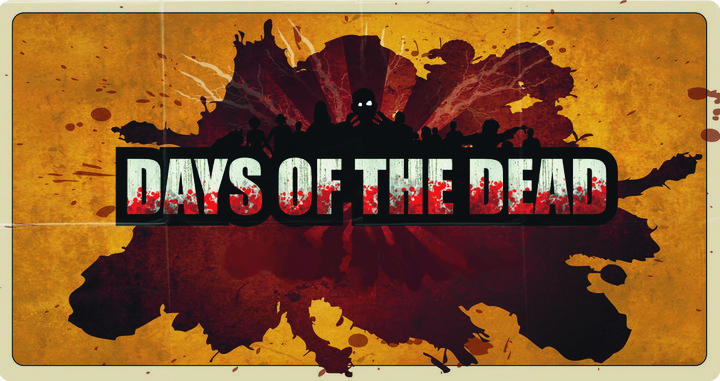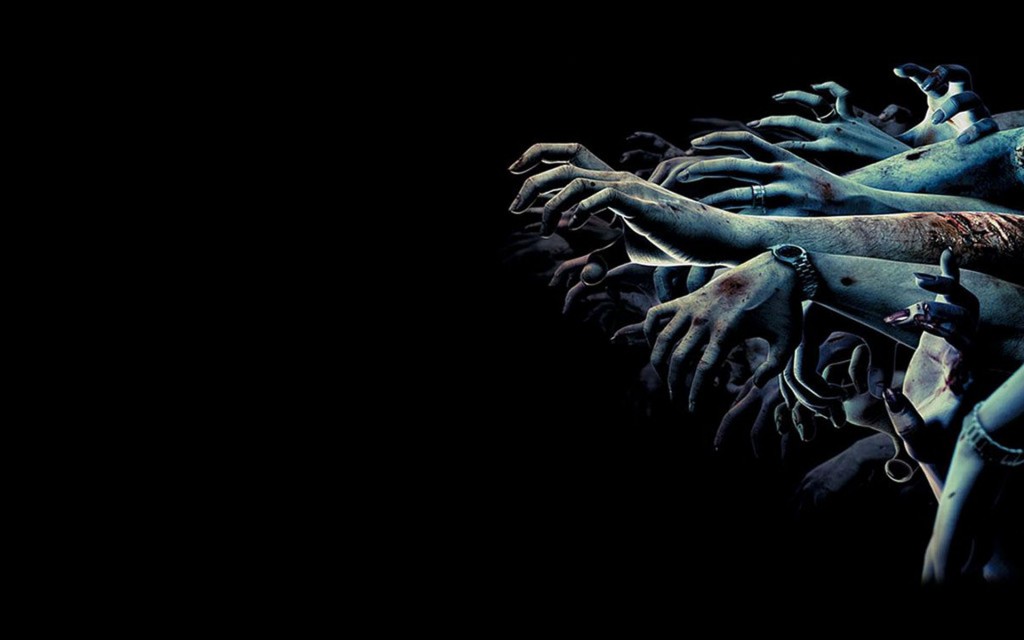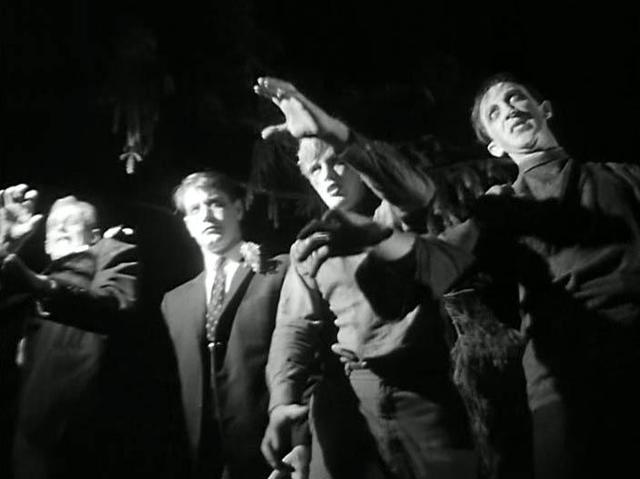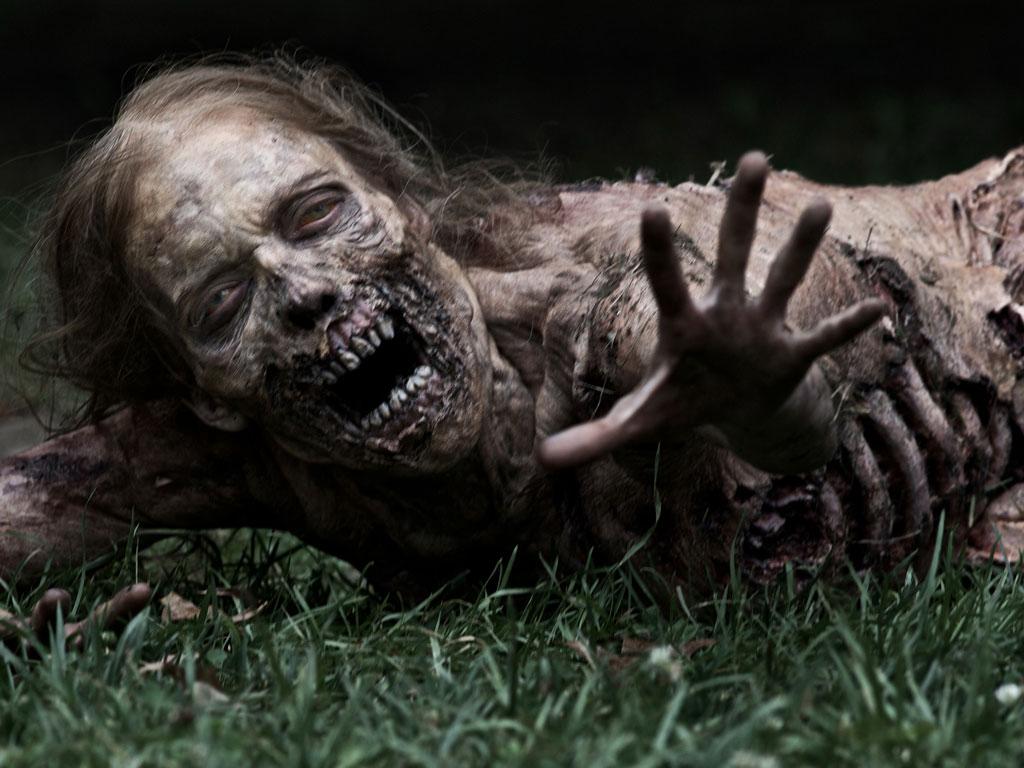by Todd Card:
Zombies. What is the fascination? What is it that drives people wild about them? I intended to find out. With two separate naked, “bath salt” cannibalistic type face-eating incidents making the National news recently, I thought it best to find out. After all, with this type of behavior popping up in reality, there could be a need to know.
I know why I love zombies (which I’ll get to later), but to thoroughly know why others do, the question needed to be asked on a larger scale. Previously, I have asked my fellow zombie loving cohorts online. The typical response being, “You know… that’s not an easy question to answer.” Not much help. So I decided to ask the fun and interesting individuals at a horror convention. Coincidently I was within a mere two weeks of a horror convention – Days of the Dead – during its second annual convergence in Indianapolis.
The powers that be (DarkMedia.com) and I thought it would be a great idea to poll as many convention enthusiasts as possible. Granted, this poll was not conducted scientifically – with hundreds of thousands of people from different ethnic, regional, religious, and sociopolitical backgrounds, but it was good enough for us!
DarkMedia generously provided a simple, yet highly effective questionnaire to present to the convention goers. They also provided some things to give to those who were kind enough to stop and take the poll. And the cherry on top – a black t-shirt emblazoned with the cover of the classic movie ZOMBIE! To give away to whomever I felt had the best answer during the convention. They really did an outstanding job of helping me gather the necessary research in a short amount of time.
Days of the Dead had arrived before I knew it. I was excited to learn what the public-at-large had for an answer to this question! Several weeks before the event I had asked my #1 (local) fan, Aaron Hoover if he wanted to attend the convention with me and sit at my table. He’s been a strong supporter and advocate for my novel from ‘before’ it was released over a year ago. You see… I met Aaron over the phone while I was conducting research for my book strangely enough and now here he was a year later, helping me with every aspect of the show, spending an entire weekend away from his family, and enjoying the three-day convention from the vendors side of the table instead of being a patron for a change. Here is a perfect example of how research can work in strange ways for a writer and why I highly advise other writers to do as much of it as they can.

Over the course of those three days I was swamped with people buying books, asking questions, taking pictures, and there were even people who had bought a signed copy from me a year ago at the same event come back to purchase another as a keepsake or to give as a gift. I suddenly found myself deprived of time to address the question of why these people loved zombies so much! I was SWAMPED!!!
Mr. Hoover filled out the first question with his answer and then instantly jumped into action, approaching anyone and everyone who came within five feet of our table! I watched in amazement as he asked them the question, they gave a perplexing look and then dialogue began. I had people standing next to me to take a picture after I had just signed their copy of Hell Cometh, while Aaron Hoover had people bending over at my table answering the question in writing!
Aaron relentlessly polled everyone he could get to talk with him. He was a machine! He approached anyone who looked like they were into zombies, whether it was because they were wearing a zombie related t-shirt or they were dressed in full-blown zombie gore regalia. He worked with dogged determination to get answers!
Having Mr. Hoover at my side for this second appearance at Days of the Dead was a blast and he was so full of energy and excitement, he simply made the entire experience a thousand times better than I had ever anticipated. And, he successfully managed to collect enough answers to fill the entire stack of questionnaires!
For a couple of weeks after the convention ended I counted them and then I attempted to wrangle each differently worded answer into its own category. In doing so, I was able to come up with around fifteen general reasons why people love and or freaked out by zombies. The vast majority of people actually took the time to give a legitimate answer, and some people even took the paper back with them and brought it back the next day, they wanted to be so thorough.
Of those fifteen different categorized answers, some were obvious half-hearted attempts to just be silly during the process. So I won’t mention them now… But of those who answered in earnest and who also wrote similar answers that could be tabulated and compared in large numbers, I will list the eight most popular reasons given during the convention.
I decided for this article to name each category and quote the best answer given (exactly as it was written by each participant in the study) as well as the name of the person who articulated the most detailed answer for that category. The actual question DarkMedia asked was this: “Why are people so fascinated by zombies and zombie fiction?”

- Future Effect: By far, more people answered they honestly felt this is how the world will soon end. The best answer was given by, Elizabeth Caudill: “I think it’s something that can happen in the future with all biochemical warfare, etc. Maybe not as books portray necessarily but similar.”
- Survivalist Mentality and Family Factor: The second most popular answer was based around the serious issues of survival and doing so within a family unit. The best answer was given by, Bill Davis: “You never know what you’re going to get with a zombie. Could be your wife, husband, mom, dad, or child. Then you have to take care of them with your shotgun.”
- Living Vicariously Through Zombie Fantasy Factor: Many people loved the thrill of living through books, movies, and video games to test their metal against a zombie apocalypse. The best answer was given by, Aaron Hoover: “I feel that people wish to live through the characters in the books and movies. Perhaps it’s because, during an apocalypse, wielding an arsenal of weapons and doing whatever it takes to survive, will be seen as “NORMAL”’
- Killing Without Remorse / Survival of the Fittest Factor: Disturbingly enough, there were many people we talked to who thought it would be fantastic to just kill humans without caring, just as long as they were alive at the end. The best answer was given by, Ellie Church: “The ability to shoot a human and not feel bad about it.” (She even went so far as to finish the sentence with a smiley face)
- Cultural Escapism Factor: Quite a few people wrote about escaping the pressures of society and relating to living in a world ruled by anarchy where mankind has reverted back to a state of basic existence. The best answer was given by a man who stated to me, “I’m currently going for my PHD and I lecture my students, sighting a zombie apocalypse as a prime example”, but he did not give me the name of his course of study or the University in which he currently attends. Michael Steinhour: “In truth the fascination with zombies is a fascination with and a fear of ourselves. Zombies are us without laws, without morality, without culture, in a primordial state. Today technology divides us alienating us, while phantom threats to our safety keep us living in fear. The zombie, at its core represents an escape from social pressures and aggressive rules while providing an effigy of our fears just waiting to be destroyed in a creative way.” (Mr. Steinhour was with a group of four other individuals who had all purchased a copy of Hell Cometh from me at last year’s Days of the Dead convention. He stated none of them would allow him to borrow their copy, so he was there to get one for himself.)
- Mass Effect / Pandemic Fear Factor: These people all wrote they lived with the fear of a global viral outbreak that would decimate the world’s human population, and a zombie virus was at the heart of their fascination. The best answer was given by, Ayse Howard: “I am because of the idea of a virus just overcoming all except natural instinct is fascinating.”
- Primal Fear Factor: Many of these people feared something that is encoded in our human DNA. The fear of being attacked and eaten alive. The best answer was given by, Stacey Mohr: “Zombies represent a primal fear of being eaten alive by something, someone that should not be animated or alive.
- Because They Are Cool Factor: This group of people love zombies because of the blood and guts and flesh eating destruction involved. By far the best answer was summed up by a young boy, somewhere between the age of 8 and 11. His name was Joey Brooks and here’s his answer. “I like zombies ‘cause they eat brains.” (We all got a big kick out of this young man, who’s mother, aunt, and aunt’s friend all three bought a copy of Hell Cometh! While they were doing that, Joey stepped around the edge of the table and put out his right hand for me to shake. He stated, “It’s very nice to meet you Mr. Card.” What a great kid!)
Shortly after the convention was over, like magic… The second source of my research fell into my lap. This source would be based in science and was a news article written by CNN.com San Diego news affiliate Elizabeth Landau and posted at 5:21 PM EDT, Wednesday July 11, 2012 entitled “Why zombies, robots, and clowns freak us out?”
The first line of the post read, “What do zombies and androids have in common? They’re almost human, but not quite. That disconnect is creepy, in a way that scientists are searching to understand.” This was a strong indication that there is a global question over why we, as humans, find our likeness but disconnected from its humanity disturbing and at the same time fascinating. I would have my second source of research and it was going to be a bunch of scientists who wanted to know the answer to the same question we were asking!
Elizabeth Landau refered to this phenomenon — this fascination we have as the, “valley effect” as defined by Ayse Saygin, professor at the University of California, San Diego and her colleagues. Last year Professor Saygin and her colleagues published a study using the findings from a functional magnetic resonance imaging machine (fMRI). This scientific team using this very high-tech and expensive device were able to demonstrate on a graph (produced by this piece of highly advanced technology) a “valley” in the graph forms when human characteristics are absent in one humanoid subject, and then comes back up again when the human characteristics return while encountered by the other subjects attached to the machine during the study.
The piece went a bit further, “Professor Saygin stated that she and her colleagues hypothesized that, at least in part, the effect might result from a violation of the brain’s predictions. When we anticipate one thing but see another, we get an error, and that error makes us shy away from the thing we’re viewing.” Or, from my experience as a writer — a lot of people, from all over the world are quite fascinated by this error, this “valley effect”. So, there is a documented physiological psychological reason for why people love zombies!
This CNN.com post went on to note for over at least the last hundred years there have been other elaborate, expensive, and time-intensive studies conducted with an intense fascination of this “valley effect” dating all the way back to 1906 and an essay written by Ernst Jentsch called “the uncanny”.
His paper outlined the same human reactions when subjects where exposed to humanoid examples, devoid of humanity. Sigmund Freud himself followed up the essay thirteen years later. Indicating to me, this question has been around for quite some time. And, science has yet to produce definitive proof of why people are fascinated by zombies and zombie fiction. Even the most educated minds and world-renowned names in various disciplines over the course of the last one hundred years have not been able to produce much more than a defined dip on a chart that says we freak out when we see zombies, robots, and clowns.
This brings me to my third and final source of research, my personal opinion about the flesh-eating and relentlessly driven zombie. On October 1, 1968 Night of the Living Dead, an American independent horror film directed by George A. Romero, starring Duane Jones, Judith O’Dea and Karl Hardman debuted. The cult film seen around the world by millions and grossing millions to this day, in my opinion, gave the world what we now know as the cannibal zombie.

Night of the Living Dead
An instant classic monster with only one rival, as far as I can see, dwelling within its own particular sub-genre of horror… The vampire. Both need to feed on living humans to continue to live on as a dead creature. What an ironic but proven twist! I would say this new boogieman separates itself from other known monsters of horror.
Although we understand through folklore werewolves need to feed on a lunar cycle, they can be satisfied by the occasional bear, elk, but mostly seem to remain beastly and if you get are booted out of an English pub by the ominous stares of its nightly occupants for sticking your foot in your mouth and stray away from the road… Onto the moors, you may have an angry werewolf do contend with. But in some ways the werewolf can fall into the same category as the vampire and zombie, given the right set of creative circumstances.
Recently a fellow writer who’s far more successful than I went so far as to present us with the “vegetarian vampire” who feeds on bear, deer, mountain lions, and so forth because of their desire to spare human lives. A vegetarian that still eats meat? And suffers a deep compassion for humans? This, in my opinion, takes the vampire, beastly werewolves and even other fearsome monsters -out- of the category of the ‘zombie’ because of its most recent adaptations of the classic monster. These days, it would seem we are and have, as creative souls, decided to tame the savage beast by humanizing it along with other classic creations of the world of horror.
As a writer of only a singular piece of published zombie fiction, when you write a love story and just happen to include vampires and werewolves as character elements; your fiction flies away from any remnant of horror and still lands squarely in the face of romance. Period!
This effect can be achieved with any sub-genre of horror by basically writing a love story and sprinkling in a few historically scary monsters here and there for good measure. Just for the record, the highly successful novel series I have vaguely sited for example are classified on their CIP pages, (Cataloging in Publication is a bibliographic record prepared by the Library of Congress for a book that has not yet been published) as primarily: [1. Vampires — Fiction. 2. Werewolves — Fiction. Etc.]”, and not [1.Horror — Fiction. Etc.]
For those who even debate the example I have provided (and I have personally been witness to more than enough heated banter about this particular example, than I care to mention), the series is not classified anywhere as horror. And yet, this series, with all its amazing success has confounded horror writers and horror fiction devotees for its use of classic horror elements! Are we, in essence, overriding the “valley effect” to keep our collective interest alive?
Make no mistake; the vampire has almost always been associated with passion and lustful yearnings — practically since the inception of the genre. Human traits to be certain but painted in a macabre light for the sake of terror. So, I can see how a fantastically creative mind, in this modern world, could construct a bridge believable enough for a certain segment of our population to cross the “valley effect”. Leaving the zombie to remain, for now, firmly entrenched in the field of horror.
DarkMedia.com wanted to know why I love zombies, and why they scare me? I consider myself part of the experiment too! I will act as the third part of my research and give you six reasons why I love them:
- They don’t care—they eat.
- They don’t tell jokes or sing and dance—they eat.
- They don’t fall in love and risk everything to be with some poor confused lovesick waif who just moved to town—they eat.
- They multiply with each victim and don’t have a code of conduct to follow—they eat.
- They don’t have a supreme council in Italy to answer to—they eat.
- Sooner or later, whether they walk slow or run, their numbers will catch up to you and when they do, what will they want to do when they find you? EAT!!!

The Walking Dead
But even I, as the writer of Hell Cometh, tampered with the mindless, soulless, and aimless undead by inflicting demonic control over them. Zombies from Hell!!! Controlled by the son of Satan! So… Even I, a self-proclaimed zombie purist could not resist tampering with the flesh-starved living dead masses. I had to put my own special spin on things. Those who live in glass houses? True… I admit it.
My conclusion? I feel the answer to this question is as individualized as each and every person who is fascinated by zombies or loves zombie fiction. The answer lies back in our lives when we were very young and had just discovered zombies like Joey Brooks with his simple answer, “I like zombies ‘cause they eat brains.”
However, as we age and refine ourselves as individuals. Some call the process, growing up. The answer changes with our adventure through a magnificent cultural phenomenon, given to us on October 1, 1968 when Night of the Living Dead first appeared. If we stay fascinated in this unique genre and continue to love zombie fiction, the answer when you are 42 going on 43 to that same simple question, can be as complicated as we find the world around us, when asked.
DarkMedia partner and contributor Todd Card is a full-time freelance writer, online journal content editor, and e-book author. He’s an active member of several creative writing and critique organizations, including the Southern Horror Writers Association. His debut novel, Hell Cometh, was released in June 2011 to overwhelmingly positive reviews, selling out on Amazon.com four times within its first three months of availability. He can be found on his website, Facebook and on Twitter @HellCometh.
DarkMedia would like to thank our staff writer Alex McDermott for his zombie expertise.
















8 Comments